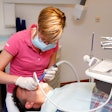
Pregnant women who are incarcerated or whose partner is incarcerated experienced worse oral health outcomes, according to a study published on October 19 in Social Science and Medicine.
Previous studies have confirmed an association between incarceration and poor oral health. Similarly, recent scholarship has shown that women exposed to incarceration during pregnancy incur worse health outcomes. However, until now, no previous research has assessed the link between incarceration exposure and oral health during pregnancy, according to the study's authors.
"Women exposed to incarceration exhibited worse oral health outcomes in the form of being more likely to report not knowing the importance of oral care, not having an oral health discussion with a provider, not getting a teeth cleaning, as well as being likely to report needing to see a dental provider, having visited a dental provider for a problem during pregnancy, and having more unmet dental care needs," explained the study's coauthors, Alexander Testa and Chantal Fahmy of the University of Texas.
Testa and Fahmy analyzed data from the Pregnancy Risk Assessment Monitoring System from 2016 to 2019 to assess the relationship between incarceration and oral health. This study, in particular, enhances research on the health consequences of incarceration by linking a partner's incarceration to the health of their nonincarcerated partner.
During a partner's incarceration, a woman may bear the burden of familial care, along with all of the household's financial obligations, incurring high stress. Stress and its associated adverse coping strategies may create a predicament where a woman's oral health is of low priority throughout her pregnancy.
Given the current lack of access to health services in prisons and jails, it is unsurprising that incarcerated women may not receive timely oral healthcare services and education, the authors wrote. For example, in a survey tracking the U.S. Department of Corrections' (DOC) utilization of oral healthcare across 45 states, the majority of the care provided -- 72% -- was emergency care, with only limited routine care given.
Similarly, oral health needs and barriers differ between individuals who are incarcerated and those who are not. The needs of people who are incarcerated commonly revolve around addressing immediate pain or infections while the barriers they face are likely related to access to care and medical distrust.
Convesely, the needs of those who are not incarcerated are related more to preventive care and routine visits while the barriers they face are commonly related to finances or unease in visiting the dentist. "Additional research in this area to better ascertain the availability and access to oral health care within DOCs and the general population is warranted," the authors wrote.
These findings contribute to growing research on the effect of incarceration on the health and well-being of pregnant women.
"Given the influence of both incarceration exposure and oral health during pregnancy for maternal and infant health, the findings suggest that coordination between criminal justice, public health, and oral health experts can develop programmatic efforts that expand access to oral health care and improve health literacy among incarceration-exposed pregnant women," Testa and Fahmy concluded.



















